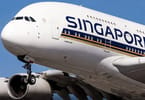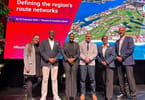(eTN) Egnatia Academy and its CEO Ali Kasa achieved the rare combination of running a tourism conference featuring both high-quality speakers and leaving delegates with a vast array of practical solutions to security and safety challenges, which could immediately be implemented in their businesses or destinations.
The International Tourism Safety & Security Conference was held in the Malaysian capital, Kuala Lumpur, between June 14-17 and attracted about 60 delegates from 20 countries, most of whom were responsible for security in tourism and hospitality businesses or were senior officials of national tourism authorities or senior police officers responsible for event and tourism-related security in their respective countries,
The opening speaker, Dr. Peter Tarlow, president of the US Tourism Security Association, explained the concept of tourism-oriented policing in which security for hotels, events, conventions, and casinos is structured and operated to complement with tourism rather that clash with tourism and hospitality.
Eduardo Lette from Portugal gave a fascinating insight into the problems associated with providing security at sporting events, including the protection of competitors from the temptations which could result in them being the subject of scandals.
Greg Duffell, CEO of Pacific Asia Travel Association (PATA), provided delegates with an overview of major security threats to tourism in the Asia Pacific region over the past decade. He quoted research conducted by leading credit card provider, VISA, which indicates that safety is the no. 1 concern of international travelers globally. PATA’s global headquarters is in Bangkok, and Greg’s office was located in the midst of the Red Shirt protest zone during Bangkok’s political disturbances in May.
Mr. Duffell told delegates that during the days when it was impossible to work from PATA’s office because of the clashes between Red Shirt protesters and the military, PATA continued to operate as a mobile head office. PATA is currently working closely with the Thai Tourism Authority in accelerating the recovery of Thailand’s tourism industry following the recent unrest. Mr. Duffell stressed the importance of government-private sector cooperation in restoring destination image and reassuring travelers, following security-related problems and the establishment of an open, transparent, and honest partnership with the media to treat recovery as seriously as they treated a crisis.
Two British speakers, Andrew Clancy, a UK police officer of 30 years standing, and Andy Hays, a CCTV electronic surveillance specialist, provided a detailed assessment of effective security practices for hotels, attractions, tourism precincts, airports, and transport. I sat in on a day of Mr. Clancy’s two-day workshop following the conference, and his in-depth knowledge of applying security operations to the special needs of tourism was most impressive. Clancy and many other speakers pointed out that when conducted properly, good security adds value to the tourism experience and can be a major marketing asset for tourism destinations and businesses.
Mr. Imtiaz Muqbil, editor of Thai-based Travel Impact Newswire, gave a revealing insight into the media’s approach to security-related tourism issues. He stated that most journalists are committed to reporting the truth. He urged the tourism industry to treat their relations with the media as one of mutual respect with an overriding commitment to huild mutual trust based on transparency.
Tony Nichols, a former Grenadier Guard who has had a long career in hotel security in London, provided some revealing examples of the challenges involved in hotel security and the relationship between hotels and the media who may seek access to celebrity guests or who may misreport incidents at a hotel, which may compromise the reputation of the hotel.
The author of this article focused on the issue of building relations between the tourism industry and governments to ensure that government travel advisories accurately reflected the state of safety in destinations.
According to Egnatia CEO Mr. Al Kasa, delegates to the this conference gave the two-day conference and the two subsequent days of workshops run by Peter Tarlow, Andrew Clancy, and the author, an emphatic vote of approval. The conference was given enhanced relevance by the fact that during the conference period, Malaysian authorities arrested several Al Qaeda suspects who were alleged to be plotting attacks on mosques in Malaysia.
Dr. David Beirman is a senior lecturer in tourism at the University of Technology-Sydney. He was a speaker at the conference and ran a workshop on post-crisis recovery.
WHAT TO TAKE AWAY FROM THIS ARTICLE:
- Tony Nichols, a former Grenadier Guard who has had a long career in hotel security in London, provided some revealing examples of the challenges involved in hotel security and the relationship between hotels and the media who may seek access to celebrity guests or who may misreport incidents at a hotel, which may compromise the reputation of the hotel.
- Peter Tarlow, president of the US Tourism Security Association, explained the concept of tourism-oriented policing in which security for hotels, events, conventions, and casinos is structured and operated to complement with tourism rather that clash with tourism and hospitality.
- Duffell stressed the importance of government-private sector cooperation in restoring destination image and reassuring travelers, following security-related problems and the establishment of an open, transparent, and honest partnership with the media to treat recovery as seriously as they treated a crisis.






















